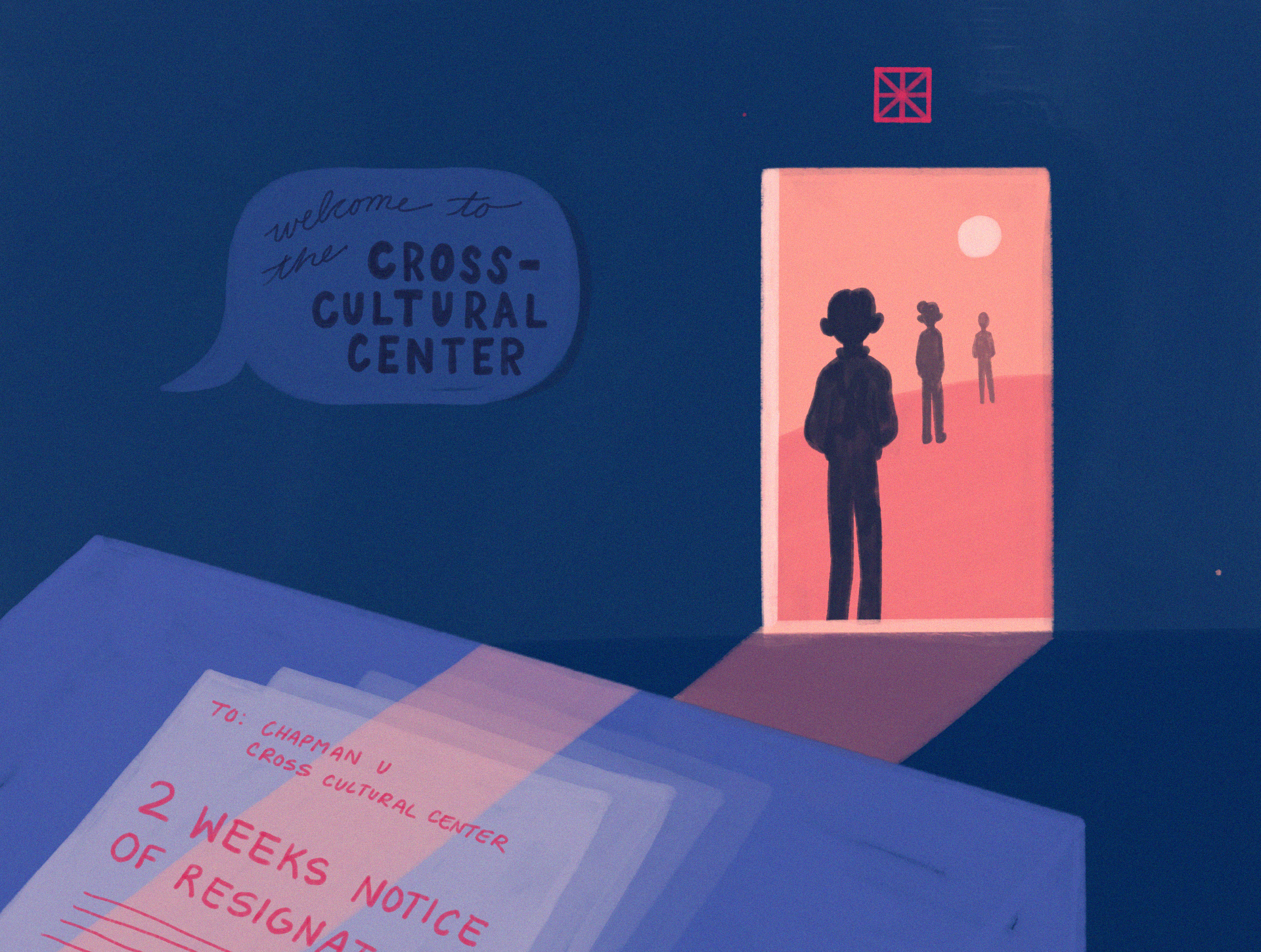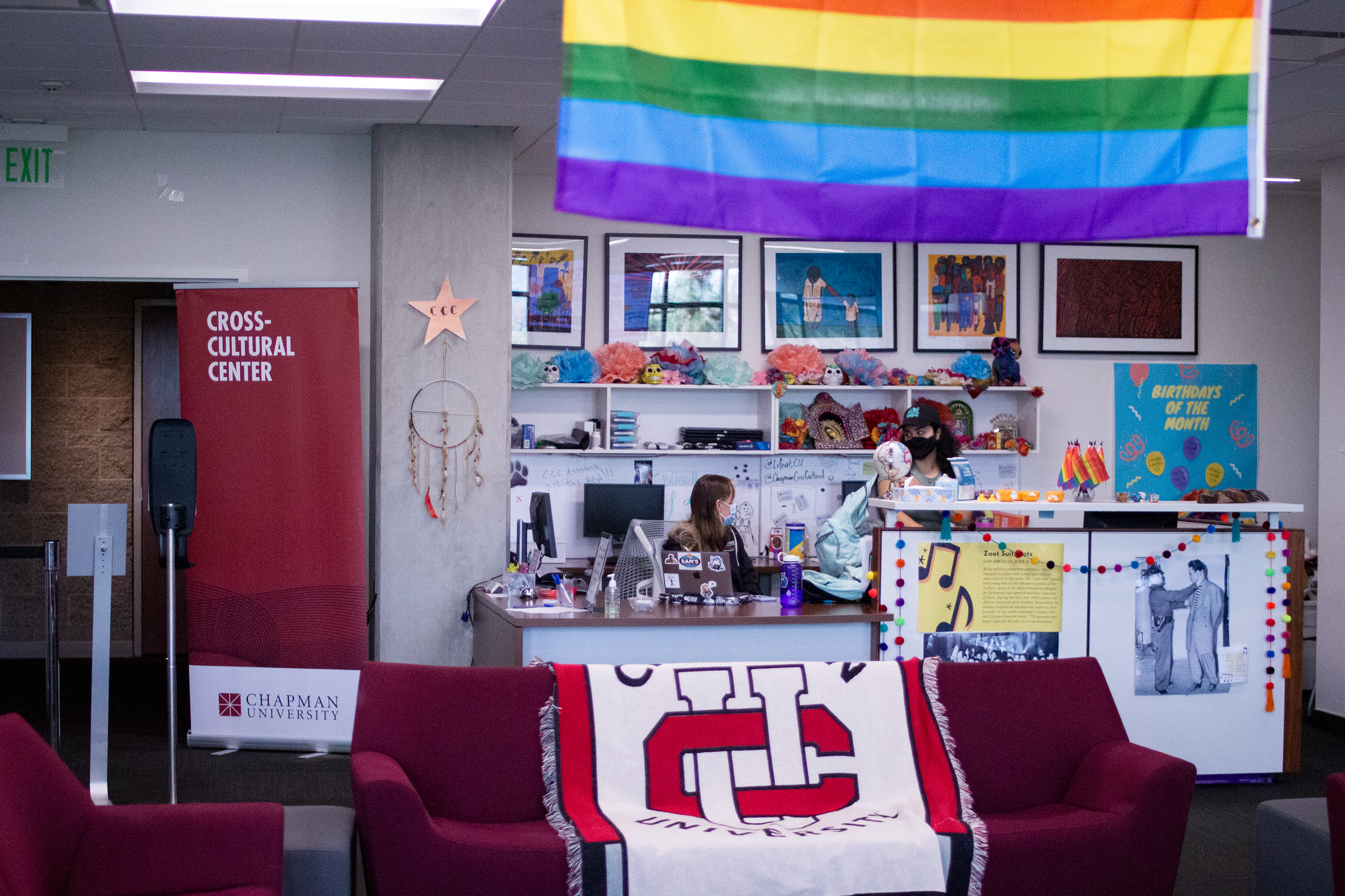Chapman’s Cross-Cultural Center sees third resignation in one month
Illustration by KAITA PANNOR, Illustrator
Following the departure of a third employee from the CCC, students and faculty react to the university’s upholding of diversity, equity and inclusion initiatives.
In the course of one month, Chapman’s Cross-Cultural Center (CCC) saw resignations from former program coordinators Shishei Tsang and Tim Topper. Tsang decided to leave for a new work opportunity but did not disclose further details with The Panther. Topper, though, said that his departure was heavily influenced by a lack of support he felt from administration.
Now, Paige Reinstein, the center’s graduate assistant who is working towards their dual master’s degree in counseling and personnel service and professional clinical counseling, is also resigning from the center. Reinstein declined to speak with The Panther as to why they are leaving.
After three consecutive departures of CCC employees, the Chapman community is voicing concern about if the trend is reflective of shortcomings in the university’s approach to diversity, equity and inclusion (DEI).
“Chapman can say they’re committed to diversity, equity (and) inclusion — we can hire Dr. Reginald (Stewart), but that doesn’t mean that all the work is done,” said Daniel McGreevy, a junior political science major and a CCC lead assistant. “We still need to be supporting faculty of color and recruiting faculty of color actively.”
But Vice President of DEI Reginald Stewart told The Panther he does not believe Tsang and Topper leaving is explicitly a result of the university’s handling of DEI initiatives.
“I don’t think we can make this wholesale referendum that, anytime an employee departs, that means there’s something really insidious,” Stewart said. “It means that I think for (Tsang and Topper), it wasn’t a good fit anymore, and they found a better fit.”
Talks of creating a multicultural center at Chapman can be traced back to 2011, when former university President Jim Doti filed a deposition for a discrimination lawsuit brought against the university in 2010. In this deposition, Jim Doti opposed the creation of a multicultural center under the rationale “it would ‘ghettoize’ the campus.”
“Why would a center that’s supposed to celebrate and educate about people’s backgrounds be ghettoizing the campus if Chapman places such an emphasis on its diversity when it’s advertising to prospective students?” said Marjan Moshiri, a senior sociology major and CCC lead assistant.
It took until 2017 for the CCC to reach fruition under the new guidance of President Daniele Struppa after years of students pushing for its implementation. With Tsang and Topper leaving, some members of the Chapman community are concerned this indicates Chapman’s failure to effectively maintain the CCC — a resource that was so greatly pushed for.
Chapman’s Cross-Cultural Center used to house former employees like Shishei Tsang and Tim Topper. DANIEL PEARSON, Photo Editor
“Chapman isn’t really great at these (DEI) issues,” McGreevy said. “(We’ve had) prospective students come in (to the center) and talk to us about it.”
In the meantime, the search to find new program coordinators has not yet started, according to Stewart. He is currently looking at the job responsibilities of the role and figuring out what direction he thinks the center should go in.
“This is a good time to reimagine and reconfigure what your Cross-Cultural Center is going to look like for the next five or 10 years,” Stewart said. “The goal is not to just have one organization or one person leave and then just replace them immediately.”
Student Engagement staff members Chris Hutchison, the associate dean of students, and Justin Koppelman, the director of Student Engagement, will continue taking on the responsibilities of the CCC.
“The most important thing when you have turnover is to minimize disruption in service,” Stewart said. “You don’t want people who frequent the Cross-Cultural Center and who benefit from it to be disadvantaged, because you don’t have a full-time person in there. If you have strong people, you can keep it moving until you reposition it.”
Moshiri also noted student employees “got a few practice rounds” of what running the center would be like without Topper, while he was in the process of transitioning to his new role at the University of California, Los Angeles.
While Moshiri is happy for the new opportunities Tsang and Topper have found, she said their departure leaves remaining employees without needed leadership.
Moshiri first learned about the center during her freshman year when she participated in the Emerging Leaders program’s campaign: “I Am Chapman,” which was overseen by Topper at the time. The two had met before the freshman orientation had even begun.
“I’ve always come here, and I’ve always known about the CCC, and it’s just been a huge support system for me,” Moshiri said. “If there were ever issues of race on campus or (issues) to me or something, I always knew that I could come and talk to Topper about it. I knew that the CCC would be here for me.”
Moshiri conceded her experience with DEI on campus has not been entirely positive due to an instance where a professor made a discriminatory remark to her, but she is hopeful that things will improve under Stewart’s leadership.
Since Stewart’s arrival to the Chapman campus three months ago, he has been using the time to learn about the CCC and how he can help the center expand and evolve. Stewart also said he would like to look at cross-cultural centers from a range of other universities.
“The work of DEI (is) making sure that people who have been historically underrepresented and systemically excluded from higher education have a place to go to be supported, grow, mature and evolve into the academics and professionals they want to be,” Stewart said.
McGreevy, who has also been working at the CCC since the start of the semester, said the center has made a great impact during his time at Chapman.
“Coming to Chapman and then having so many straight people and so many more white people than my public high school was even a culture shock for me as a white man,” McGreevy said. “Chapman is so wealthy and white, and that’s just not what I grew up with. Being able to talk to people with more similar perspectives to me (has) been great.”


